- Home
- Ian McDonald
Scissors Cut Paper Wrap Stone Page 16
Scissors Cut Paper Wrap Stone Read online
Page 16
The sole occupant of the dome, Torben was also the sole passenger on this whole alien, paradoxical ship. Another would have been good. Another could have shared the daily, almost hourly shocks of strange and new and wonder. His other Aspects had felt with Torben the breath-catch of awe, and even greater privilege, when he had looked from the orbital car of the space elevator—the Anpreen’s gift to the peoples of Tay—and seen the shatter-ship turn out of occultation in a blaze of silver light as it came in to dock. They had felt his glow of intellectual vindication as he first swam clumsily into the star-dome and discovered, with a shock, that the orbital transfer station was no more than a cluster of navigation lights almost lost in the star fields beyond. No sense of motion. His body had experienced no hint of acceleration. He had been correct. The Anpreen could adjust the topology of spacetime. But there was no one but his several selves to tell it to. The Anpreen crew—Torben was not sure whether it was one or many, or if that distinction had any meaning—was remote and alien. On occasion, as he swam down the live-wood panelled corridors, monoflipper and web-mittens pushing thick, humid air, he had glimpsed a swirl of silver motes twisting and knotting like a captive waterspout. Always they had dispersed in his presence. But the ice beyond those wooden walls, pressing in around him, felt alive, crawling, aware.
Seriantep had gone ahead months before him.
“There’s work I have to do.”
There had been a party; there was always a party at the Anpreen Mission among the evergreen slopes of generous, volcanic Sulanj. Fellow academics, press and PR from Ctarisphay, politicians, family members, and the Anpreen Prebendaries, eerie in their uniform loveliness.
“You can do the research work on Thirty-Third Tranquil Abode, that’s the idea,” Seriantep had said. Beyond the paper lanterns hung in the trees and the glow of the carbon-sink lagoon, the lights of space-elevator cars rose up until they merged with the stars. She would ride that narrow way to orbit within days. Serejen wondered how he would next recognize her.
“You have to go.” Puzhay stood in the balcony of the Tea Lane Ladyhearth, recently opened to allow spring warmth into rooms that had sweated and stifled and stunk all winter long. She looked out at the shooting, uncoiling fresh green of the trees along Uskuben Avenue. Nothing there you have not seen before, Nejben thought. Unless it is something that is the absence of me.
“It’s not forever,” Nejben said. “I’ll be back in year, maybe two years.” But not here, he thought. He would not say it, but Puzhay knew it. As a returnee, the world’s conservatoriums would be his. Bright cities, sun-warmed campuses far from the terrible cold on this polar continent, the winter that had driven them together.
All the goodbyes, eightfold goodbyes for each of his Aspects. And then he took sail for the ancient hospice of Bleyn, for sail was the only right way to come to those reefs of ceramic chapels that had clung to the Yesger atoll for three thousand hurricane seasons.
“I need… another,” he whispered in the salt-breezy, chiming cloisters to Shaper Rejmen. “The curiosity of Serejen is too naive, the suspicion of Fejannen is too jagged, and the social niceties of Kekjay are too too eager to be liked.”
“We can work this for you,” the Shaper said. The next morning, he went down into the sweet, salt waters of the Othering Pots and let the programmed palps swarm over him, as he did for twenty mornings after. In the thunder-heavy gloaming of a late spring night storm, he awoke to find he was Torben. Clever, inquisitive, wary, socially adept and conversationally witty Torben. Extreme need and exceptional circumstances permitted the creation of Nineths, but only, always. Temporarily. Tradition as strong as an incest taboo demanded that the number of Aspects reflect the eight phases of Tay’s manic seasons.
The Anpreen shatter-ship spun on its vertical axis and Torben Reris Orhum Fejannan Kekjay Prus Rejmer Serejen Nejben looked on in wonder. Down, up, forward: His orientation shifted with every breath of air in the observation dome. An eye, a monstrous eye. Superstition chilled him, childhood stories of the Dejved whose sole eye was the eye of the storm and whose body was the storm entire. Then he unfolded the metaphor. An anti-eye. Tejaphay was a shield of heartbreaking blue, streaked and whorled with perpetual storms. The Anpreen space habitat Thirty-Third Tranquil Abode, hard-docked these two years past to the anchor end of the space elevator, was a blind white pupil, an anti-pupil, an unseeing opacity. The shatter-ship was approaching from Tejaphay’s axial plane, the mechanisms of the orbital pumping station were visible beyond the habitat’s close horizon. The space elevator was a cobweb next to the habitat’s three-hundred-kilometer bulk, less even than a thread compared to enormous Tejaphay, but as the whole assemblage turned into daylight, it woke sparkling, glittering as sun reflected from its billions of construction-ice scales. A fresh metaphor came to Torben: the sperm of the divine. You’re swimming the wrong way! he laughed to himself, delighted at this infant Aspect’s unsuspected tendency to express in metaphor what Serejen would have spoken in math, Kekjay in flattery, and Fejannen not at all. No, it’s our whole system it’s fertilizing, he thought.
The Anpreen ship drew closer, manipulating space-time on the centimeter scale. Surface details resolved from the ice glare. The hull of Thirty-Third Tranquil Abode was a chaotic mosaic of sensors, docks, manufacturing hubs, and still less comprehensible technology, all constructed from smart-ice. A white city. A flight of shatter-ships detached from docking arms like a flurry of early snow. Were some of those icy mesas defensive systems; did some of those ice canyons, as precisely cut as a skater’s figures, conceal inconceivable weapons? Had the Anpreen ever paused to consider that to all cultures of Tay, white was the colour of distrust, the white of snow in the long season of dark?
Days in free-gee had desensitised Torben sufficiently so that he was aware of thesubtle pull of nanogravity in his belly. Against the sudden excitement and the accompanying vague fear of the unknown, he tried to calculate the gravity of Thirty-Third Tranquil Abode, changing every hour as it siphoned up water from Tejaphay. While he was still computing the figures, the shatter-ship performed another orientation flip and came in to dock at one of the radial elevator heads, soft as a kiss to a loved face.
On tenth days, they went to the falls, Korpa and Belej, Sajhay and Hannaj, Yetger and Torben. When he stepped out of the elevator that had taken him down through thirty kilometers of solid ice, Torben had imagined something like the faculty of Jann; wooden-screen cloisters and courts roofed with ancient painted ceilings, thronged with bright, smart, talkative students boiling with ideas and vision. He found Korpa and Belej, Sajhay, Hannaj, and Yetger all together in a huge, windy construct of cells and tunnels and abrupt balconies and netted-in ledges, like a giant wasps’ nest suspended from the curved ceiling of the interior hollow.
“Continuum topology is a tad specialised, I’ll admit that,” Belej said. She was a sting-thin quantum-foam specialist from Yeldes in the southern archipelago of Ninnt, gone even thinner and bonier in the attenuated gravity of Thirty-Third Tranquil Abode. “If it’s action you’re looking for, you should get over to Twenty Eighth. They’re sociologists.”
Sajhay had taught him how to fly.
“There are a couple of differences from the transfer ship,” he said as he showed Torben how to pull up the fish-tail mono-tights and how the plumbing vents worked. “It’s lo-gee, but it’s not no-gee, so you will eventually come down again. And it’s easy to build up too much delta-vee. The walls are light but they’re strong and you will hurt yourself. And the nets are there for a reason. Whatever you do, don’t go through them. If you end up in that sea, it’ll take you apart.”
That sea haunted Torben’s unsettled, nanogee dreams. The world-sea, the two-hundred-twenty-kilometer diameter sphere of water, its slow, huge nanogee waves forever breaking into globes and tears the size of clouds. The seething, dissolving sea into which the Anpreen dissipated, many lives into one immense, diffuse body which whispered to him through the paper tunnels of the Soujourners’ house. No
t so strange, perhaps. Yet he constantly wondered what it would be like to fall in there, to swim against the tiny but non-negligible gravity and plunge slowly, magnificently, into the boil of waterborne motes. In his imagination, there was never any pain, only the blissful, light-filled losing of self. So good to be free from the unquiet parliament of selves.
Eight is natural, eight is holy, the Bleyn Shaper Yesger had whispered from behind ornate cloister grilles. Eight arms, eight seasons. Nine must always be unbalanced.
Conscious of each other’s too-close company, the guest scholars worked apart with their pupils. Seriantep met daily with Torben in a bulbous chapter house extruded from the mother nest. Tall hexagon-combed windows opened on the steeply downcurving horizons of Thirty-Third Tranquil Abode, stippled with the stalactite towers of those Anpreen who refused the lure of the sea. Seriantep flew daily from such a tower down around the curve of the world to alight on Torben’s balcony. She wore the same body he had known so well in the Jann Conservatorium, with the addition of a pair of functional wings in her back. She was a vision, she was a marvel, a spiritual creature from the eons-lost motherworld of the Clade: an angel. She was beauty, but since arriving in Thirty Third Tranquil Abode, Torben had only had sex with her twice. It was not the merman-angel thing, though that was a consideration to metaphor-and-ludicrous-conscious Torben. He didn’t love her as Serejen had. She noticed, she commented.
“You’re not… the same.”
Neither are you. What he said was, “I know. I couldn’t be. Serejen couldn’t have lived here. Torben can. Torben is the only one who can.” But for how long, before he splits into his component personalities?
“Do you remember the way you… he… used to see numbers?”
“Of course I do. And before that, I remember how Ptey used to see numbers. He could look up into the night sky and tell you without counting, just by knowing, how many stars there were. He could see numbers. Serejen could make them do things. For me, Torben; the numbers haven’t gone away, I just see them differently. I see them as clearly, as absolutely, but when I see the topospace transformations, I see them as words, as images and stories, as analogies. I can’t explain it any better than that.”
‘I think, no matter how long I try, how long any of us try, we will never understand how your multiple personalities work. To us, you seem a race of partial people, each a genius, a savant, in some strange obsessive way.’
Are you deliberately trying to punish me? Torben thought at the flicker-wing angel hovering before the ice-filled windows.
True, he was making colossal intuitive leaps in his twisted, abstruse discipline of spacetime geometry. Not so abstruse: the Anpreen space drives, that Taynish physicists said broke the laws of physics, reached into the elevenspace substrate of the universe to locally stretch or compress the expansion of spacetime—foreshortening ahead of the vehicle, inflating it behind. Thus the lack of any measurable acceleration, it was the entire continuum within and around the shatter-ship that had moved. Snowflakes and loxodromic curves had danced in Torben’s imagination: he had it, he had it. The secret of the Anpreen: relativistic interstellar travel, was now open to the peoples of Tay.
The other secret of the Anpreen, that was.
For all his epiphanies above the spherical ocean, Torben knew that seminars had changed. The student had become the teacher, the master the pupil. What is you want from us? Torben asked himself. Truly want, truly need?
“Don’t know, don’t care. All I know is, if I can find a commercial way to bubble quantum black holes out of elevenspace and tap the evaporation radiation, I’ll have more money than God,” said Yetger, a squat, physically uncoordinated Oprann islander who relished his countrymen’s reputation for boorishness, though Torben found him an affable conversationalist and a refined thinker. “You coming to the Falls on Tennay?”
So they set off across the sky, a little flotilla of physicists with wine and sweet biscuits to dip in it. Those older and less sure of their bodies used little airscooter units. Torben flew. He enjoyed the exercise. The challenge of a totally alien language of movement intrigued him, the fish-tail flex of the flipper-suit. He liked what it was doing to his ass muscles.
The Soujourners’-house’s western windows gave distant views of the Falls, but the sense of awe began twenty kilometers out when the thunder and shriek became audible over the constant rumble of sky traffic. The picnic party always flew high, close to the ceiling among the tower roots, so that long vistas would not spoil their pleasure. A dense forest of inverted trees, monster things grown kilometers tall in the nanogee, had been planted around the Falls, green and mist-watered by the spray. The scientists settled on to one of the many platforms sculpted from the boulevard-wide branches. Torben gratefully peeled off his fin-tights, kicked his legs free, and spun to face the Falls.
What you saw, what awed you, depended on how you looked at it. Feet down to the world-sea, head up to the roof, it was a true fall, a cylinder of falling water two hundred meters across and forty kilometers long. Feet up, head down, it was even more terrifying, a titanic geyser. The water was pumped through from the receiving station at near supersonic speeds, where it met the ocean-bead the joined waters boiled and leaped kilometers high, broke into high looping curls and crests and globes, like the fantastical flarings of solar prominences. The roar was terrific. But for the noise-abatement properties of the nanoengineered leaves, it would have meant instant deafness. Torben could feel the tree branch, as massive as any buttress wall of Jann fortress-university, shudder beneath him.
Wine was opened and poured. The biscuits, atavistically hand-baked by Hannaj, one of whose Aspects was a master pastry chef, were dipped into it and savoured. Sweet, the light sharpness of the wine and the salt mist of another world’s stolen ocean tanged Torben’s tongue.
There were rules to Tennays by the Falls. No work. No theory. No relationships. Five researchers made up a big enough group for family jealousy, small enough for cliquishness. Proper topics of conversation looked homeward; partnerships ended, children born, family successes and sicknesses, gossip, politics, and sports results.
“Oh. Here.” Yetger sent a message flake spinning lazily through the air. The Soujourners’-house exfoliated notes and message from home onto slips of whisper-thin paper that peeled from the walls like eczema. The mechanism was poetic but inaccurate; intimate messages unfurled from unintended walls to turn and waft in the strange updrafts that ran through the nest’s convoluted tunnels. It was the worst of forms to read another’s message-scurf.
Torben unfolded the rustle of paper. He read it once, blinked, read it again. Then he folded precisely in eight and folded it away in his top pocket.
“Bad news?” For a broad beast of a man, Yetger was acute to emotional subtleties. Torben swallowed.
“Nothing strange or startling.”
Then he saw where Belej stared. Her gaze drew his, drew that of everyone in the picnic party. The Falls were failing. Moment by moment, they dwindled, from a deluge to a river, from a river to a stream to a jet, a hiding shrieking thread of water. On all the platforms on all the trees, Anpreen were rising into the air, hovering in swarms, as before their eyes the Falls sputtered and ceased. Drops of water, fat as storms, formed around the lip of the suddenly exposed nozzle to break and drift, quivering, down to the spherical sea. The silence was profound. Then the trees seemed to shower blossoms as the Anpreen took to the air in hosts and choirs, flocking and storming.
Numbers and images flashed in Torben’s imagination. The fuelling could not be complete, was weeks from being complete. The ocean would fill the entire interior hollow, the stalactite cities transforming into strange reef communities. Fear gripped him and he felt Fejannen struggle to free himself from the binding into Torben. I need you here, friend, Torben said to himself, and saw the others had made the same calculations.
They flew back, a ragged flotilla strung across kilometers of airspace, battling through the ghostly aerial legions of A
npreen. The Soujourners’ house was filled with fluttering, gusting message slips shed from the walls. Torben snatched one from the air and against all etiquette read it.
Sajhay are you all right what’s happening? Come home, we are all worried about you. Love Mihenj.
The sudden voice of Suguntung, the Anpreen liaison, filled every cell of the nest, an order—polite, but an order—to come to the main viewing lounge, where an important announcement would be made. Torben had long suspected that Suguntung never left the Soujourners’ house, merely deliquesced from hominiform into airborne motes, a phase transition.
Beyond the balcony nets, the sky seethed, an apocalypse of insect humanity and storm clouds back as squid ink rolling up around the edge of the world ocean.
“I have grave news,” Suguntung said. He was a grey, sober creature, light and lithe and androgynous, without any salting of wit or humor. “At 12:18 Taynish Enclave time, we detected gravity waves passing through the system. These are consistent with a large numbers of bodies decelerating from relativistic flight.”
Consternation. Voices shouting. Questions questions questions. Suguntung held up a hand and there was quiet.
“On answer to your questions, somewhere in the region of thirty eight thousand objects. We estimate them at a range of seventy astronomical units beyond the edge of the Kuiper belt, decelerating to ten percent lightspeed for system transition.”
“Ninety three hours until they reach us,” Torben said. The numbers, the colored numbers, so beautiful, so distant.
“Yes,” said Suguntung.
“Who are they?” Belej asked.
“I know,” Torben said. “Your enemy.”
“We believe so,” Suguntung answered. “There are characteristic signatures in the gravity waves and the spectral analysis.”
Uproar. By a trick of the motes, Suguntung could raise his voice to a roar that could shout down a crowd of angry physicists.
“The Anpreen Commonweal is making immediate preparations for departure. As a matter of priority, evacuation for all guests and visitors has been arranged and will commence immediately. A transfer ship is already waiting. We are evacuating the system not only for our own protection, but to safeguard you as well. We believe that the Enemy has no quarrel with you.”

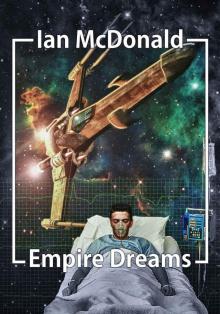 Empire Dreams
Empire Dreams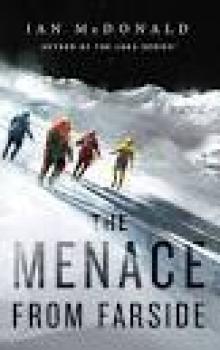 The Menace from Farside
The Menace from Farside Luna: Moon Rising
Luna: Moon Rising Moon Rising
Moon Rising Desolation Road dru-1
Desolation Road dru-1 Empress of the Sun
Empress of the Sun Ares Express dru-2
Ares Express dru-2 Tendeléo’s Story
Tendeléo’s Story River Of Gods
River Of Gods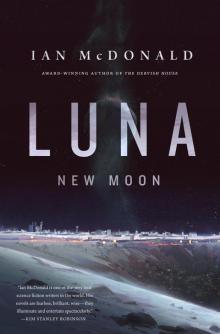 Luna
Luna![Cyberabad Days - [River of Gods 02] Read online](http://i1.bookreadfree.com/i1/03/29/cyberabad_days_-_river_of_gods_02_preview.jpg) Cyberabad Days - [River of Gods 02]
Cyberabad Days - [River of Gods 02]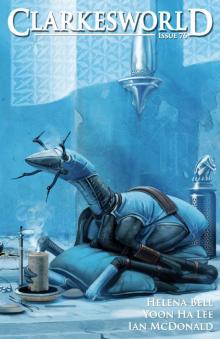 Clarkesworld Magazine Issue 76
Clarkesworld Magazine Issue 76 Brasyl (GollanczF.)
Brasyl (GollanczF.) Scissors Cut Paper Wrap Stone
Scissors Cut Paper Wrap Stone Chaga
Chaga Time Was
Time Was Cyberabad Days
Cyberabad Days Be My Enemy
Be My Enemy Changa
Changa King of Morning, Queen of Day
King of Morning, Queen of Day Out on Blue Six
Out on Blue Six Sacrifice of Fools
Sacrifice of Fools Desolation Road
Desolation Road Luna--Wolf Moon--A Novel
Luna--Wolf Moon--A Novel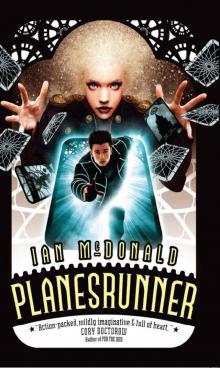 Planesrunner (Everness Book One)
Planesrunner (Everness Book One) Ares Express
Ares Express